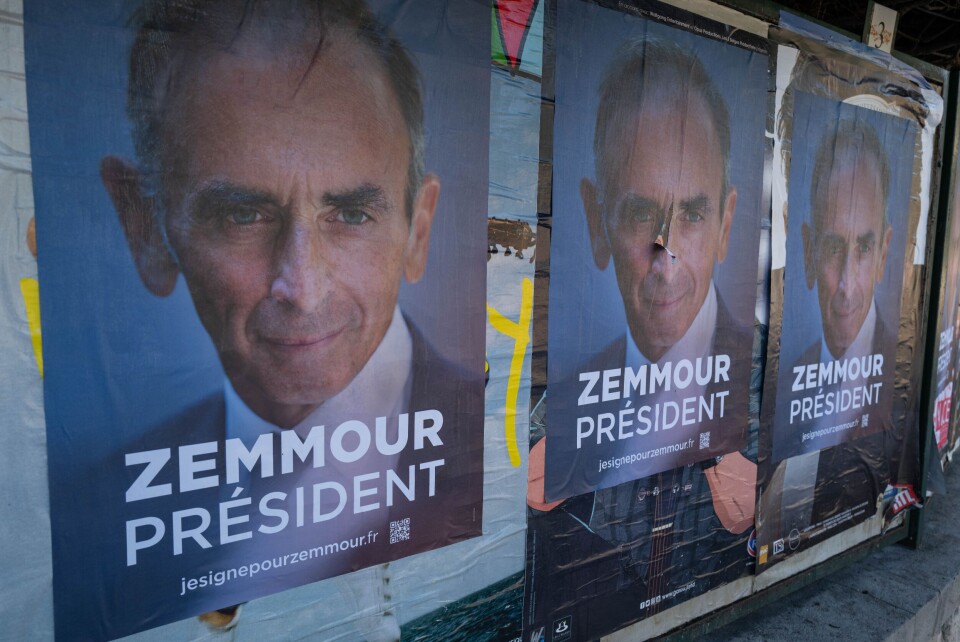-
Why your car insurance in France is expected to increase this year
Premiums are forecast to rise by four to six percent in 2026
-
Two Britons killed in avalanche in French Alps were with an instructor
French skier also died in the disaster at Val d’Isère on Friday February 13
-
British Airways launches bargain £2 flights to France (but there’s a catch)
The flights are only available to members of the airline’s Avios scheme who are redeeming loyalty points
Zemmour sparks outcry in France with ‘special needs schools’ remark
Far-right presidential election candidate widenly condemned from across the political spectrum with his comments labelled ‘miserable, brutal, discriminatory’ and ‘ignorant’

French presidential election candidate Eric Zemmour has sparked an outcry after saying that disabled children should go to ‘special schools’ and not regular state schools and that society has an ‘obsession with inclusion’.
The far-right candidate made the comments during a meeting with teachers who support his cause at Honnecourt-sur-Escaut (Nord) on Friday, January 14.
He said that he was in favour of educating children with disabilities in “special schools, except for only the slightly handicapped, of course”, rather than allowing these children to join regular classes.
He said: “I think that the obsession with inclusion is a bad move for children who are, the poor things, completely overtaken by other children. So I think that we need specialised teachers to take care of them.”
Political backlash
Mr Zemmour’s comments have sparked a backlash from across the political spectrum.
Sophie Cluzel, junior minister in charge of disability, wrote on Twitter that Mr Zemmour’s words were “a pitiful speech”. On BFMTV, she said: “I am very angry [with his] miserable and excluding” view on disabilities.
She said: “Of course, it’s not always easy, but it is really an honour that France can educate these children along with others, surrounded by others.”
She said that currently, 384,000 disabled or special needs children are educated in “regular” establishments, a rise of 20% compared to 2017. She said that in contrast, 80,000 children and teenagers are currently enrolled in “specialist” medical-educational establishments.
These are known in France as instituts médico-éducatifs (IMEs).
President of the Les Républicains party (LR, centre-right), Damien Abad, who is himself disabled, denounced Mr Zemmour’s comments as “scandalous” and accused him of wanting “segregation on all levels”. He said: “Yes, we should have an obsession with inclusion. I demand a public apology.”
Scandaleux propos d'Eric Zemmour sur la scolarisation des enfants handicapés qu'il veut exclure de l'école en milieu ordinaire. Cette ségrégation à tous les étages est une honte absolue. Oui nous devons avoir l'obsession de l'inclusion. Je demande des excuses publiques
— Damien Abad (@damienabad) January 14, 2022
LR candidate Valérie Pécresse denounced the “brutality” of the speech and said: “My goal is to improve inclusion for more fragile children.”
Far-right election candidate Marine Le Pen has also criticised Mr Zemmour’s words as an “unforgivable…attack on children who are more vulnerable due to disability”.
Left-wing candidates have also denounced the comments.
Former Justice Minister and newly-confirmed election candidate Christiane Taubira said: “As always, his words are outrageous, violent and insulting”, while Jean-Luc Mélenchon from La France insoumise said Mr Zemmour’s world view was “the opposite” of his.
Communist Fabien Roussel said he was “revolted by [Mr Zemmour’s] suggestion” and did not want “such an apartheid society”.
Révulsé par la proposion de #Zemmour qui veut exclure les enfants en situation de handicap de l'école de la République.
— Fabien Roussel (@Fabien_Roussel) January 15, 2022
Je ne veux pas de cette société d'apartheid... ni de ce projet politique dont on connaît trop bien l’histoire.
Educational backlash
Representatives of special needs associations have also hit out at the comments.
Jean-Louis Garcia, president of l’Association pour adultes et jeunes handicapés, said on BFMTV that the comments would amount to a “segregation and separation”, while Olivia Cattan, from SOS-Autisme France, said she was “indignant” at the “discriminatory and ignorant” comments from Mr Zemmour.
Matthieu Annereau, président of disability group l’Association pour la prise en compte du handicap dans les politiques publiques et privées, who is also a local LREM councillor and is himself blind, said: “The exclusion of 12 million people as suggested by Mr Zemmour is profoundly nauseating.”
Response from Zemmour
Mr Zemmour has since reiterated his position and sought to explain.
Writing on Twitter, he said: “It's an ideological position, as always. It was decided that it was better to put everyone together, but I don't agree.”
He said that his goal was “not to separate” disabled children but to “take better care of them".
He added that he would be in favour of taking the needs of each child on a case-by-case basis, with the possibility of "bridges" between "specialised" and "ordinary" institutions.
He wrote: "Of course, there are cases where putting [special needs children] in an ordinary establishment is a good thing because it allows them to progress, to socialise. And then there are other cases, real cases, more numerous than we say, where it would be a real cause of suffering for these children.
“What I wanted to say is that I don't want the obsession with inclusion to deprive us and lead us to neglect the need for specialised institutions.”
Related articles
What help is available for children with learning difficulties?
French presidential candidate Zemmour: key points of heated TV debate
Help on hand for disabled travellers
New edition of the AAWE Guide to Education in France now available
























